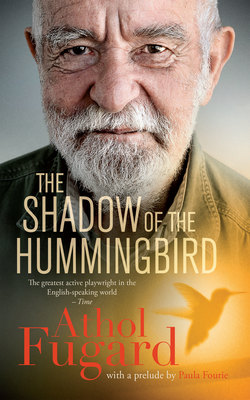Читать книгу The Shadow of the Hummingbird - Athol Fugard - Страница 6
На сайте Литреса книга снята с продажи.
Foreword to the Prelude
ОглавлениеPaula Fourie
For as long as I have known Athol, he has been tremendously excited about staging The Shadow of the Hummingbird, a short play which he wrote in 2010. However, he was also plagued by nagging doubts about the play’s length and felt that any production would have to be augmented in some way, or else combined with yet another piece. When the opportunity finally arose to stage the play, we began discussing this question in earnest. Remembering that he had once documented his fascination with shadows in a notebook entry from the 1960s, Athol finally asked me to compile an edited selection of his notebooks which he envisaged me reading to an audience before the start of the play. Through the generosity of the Lilly Library at Indiana University, where the majority of Athol’s unpublished notebooks are kept, I began working with those dating from the early 1980s to the late 1990s. In addition to this, I began reading the more recent notebooks in Athol’s possession.
As I worked through this wealth of material, a portrait seemed to emerge from the fragments that Athol had written down over the past thirty years – that of a man who loves in strange and crooked ways. And I thought of Oupa, of how much of himself Athol had poured into this character. Suddenly, the idea of a disembodied voice presenting a portrait of the author to the audience was no longer the most interesting possibility. Instead, I saw a new opening scene in which Oupa encounters himself in the pages of Athol’s notebooks, coming face to face with the dark and powerful contradictions that run through them. Athol is not Oupa, and yet he is. The boundary between the fictional and the biographical in this play has been further blurred by my conflating of their pasts, giving the retired schoolteacher the experiences and thoughts that have formed the playwright. Barring minor edits on my side, mainly to remove references to people connected with Athol or to improve the dramatic flow of a particular passage, all the excerpts that I have chosen were taken directly from Athol’s notebooks. Throughout, I have retained the original dates on which they were written, or in cases where no precise date was given, have assigned an approximate date.
Yet, as much as Athol and Oupa’s shared experiences blur the boundaries between them, the interlacing monologues in the Prelude, together with Oupa’s actions in this portion of the play, also serve to articulate their differences. I have given Oupa reactions to particular notebook entries that are very different from Athol’s own responses to the traces of his earlier self. I also know that this presented a particular acting challenge as Athol had to react to the pain and ecstasy of his past as someone other than himself, speaking from an entirely different vantage point. He also had to use someone else’s words. However, in the interests of writing an opening scene that was complementary to the main body of the play, I attempted to write material for Oupa that was stylistically attuned to Athol’s own writing, and that would also serve to further develop the character that he had created.
In putting together this piece, I have tried to introduce some of the main themes of the play, much as the prelude introduces leitmotifs in a Wagnerian music drama. I have also tried to introduce Oupa to the audience, so that by the time Athol’s play starts, we already know something about him. Most importantly, I wanted the Prelude to work as an invitation into Oupa’s little room, enabling him to share with the audience a few private moments of reflection as they turn inward with him. After all, as the old man muses: “The final landscape is within.”
